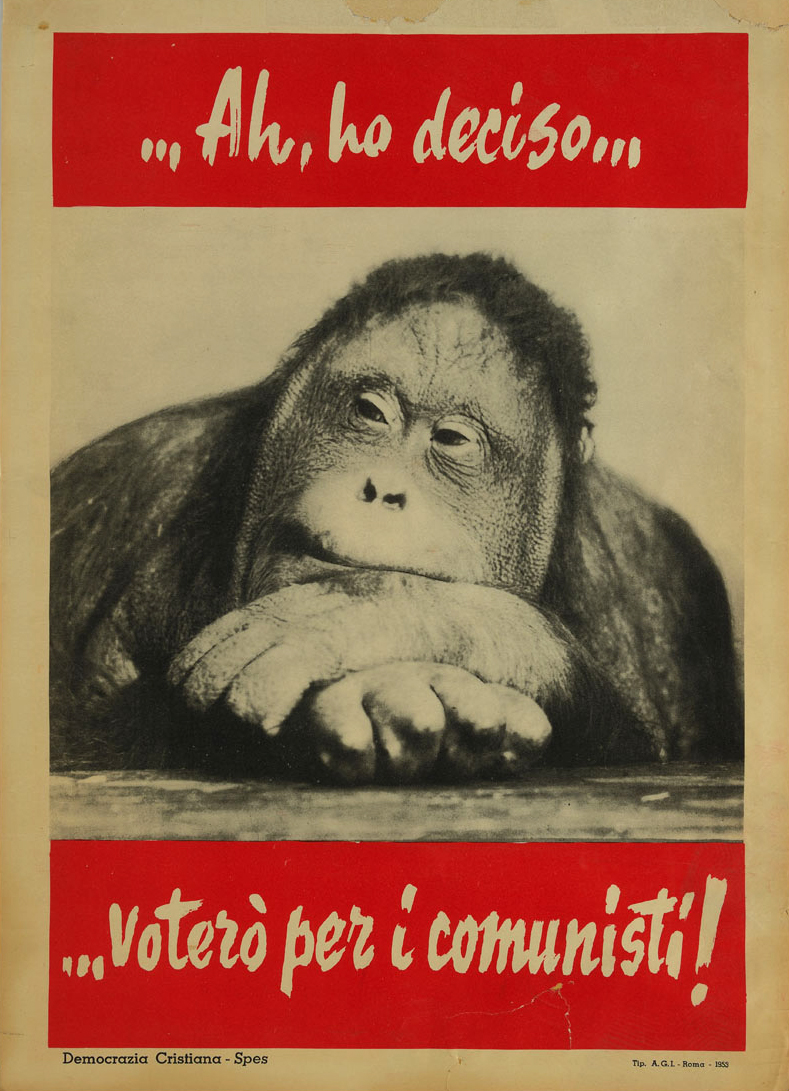- cross-posted to:
- communism@lemmygrad.ml
- cross-posted to:
- communism@lemmygrad.ml
Source: Piketty's World Inequality Report 2022
I shared this deep in a dunk thread earlier and figured there's probably many comrades who haven't seen this data. I think it's very good rhetorically because a lot of libs have an incredibly vibes-based impression that the Soviet Union was just an Animal Farm old-boss-same-as-the-new-boss situation.
Instead, this demonstrates that Russia underwent one of the most dramatic inversions of income inequality of any country in recorded history.
For comparison here is the US over the same time period:
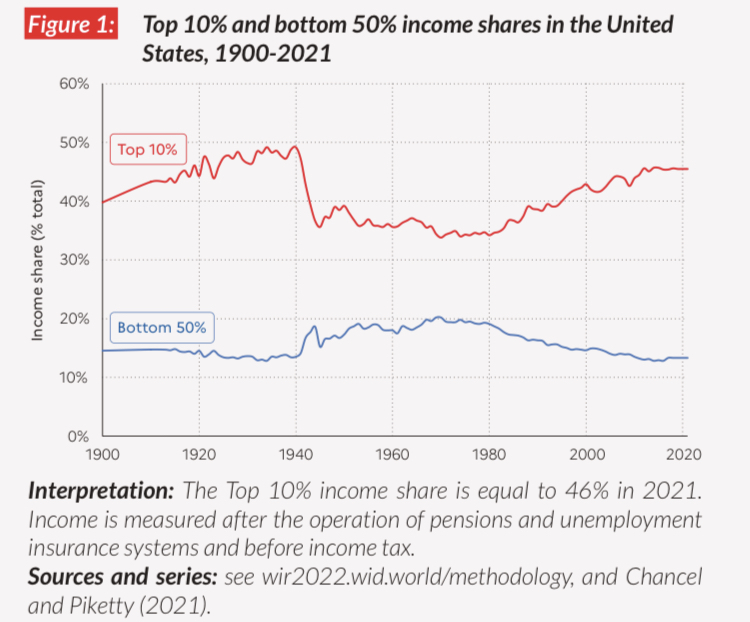
China:
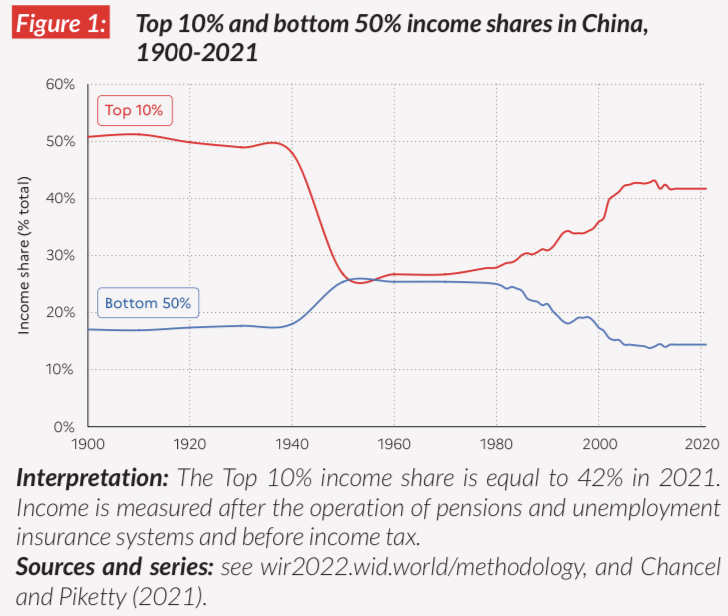
And the UK:
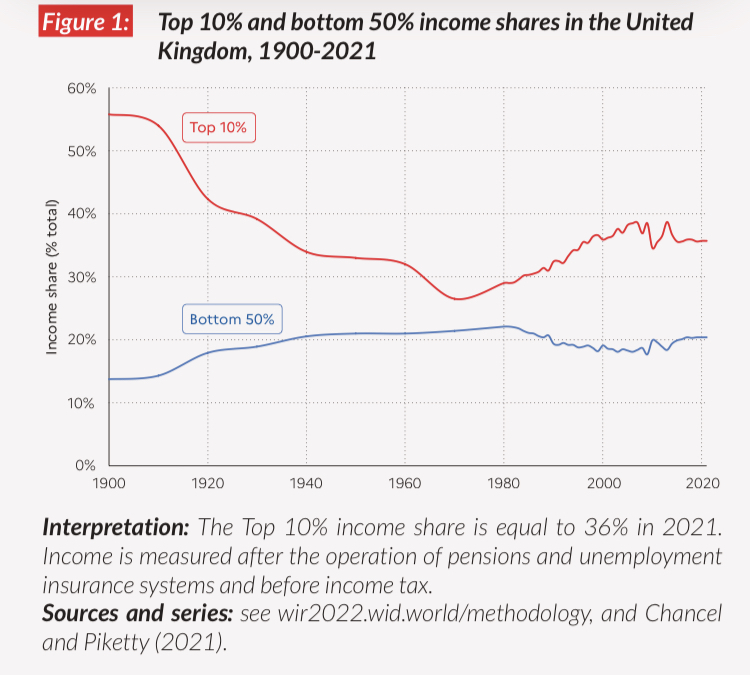
The USSR in its prime was able to challenge the USA on a lot of moral issues that would have never been brought up by other powers. For instance, I'm pretty sure that civil rights was not able to progress as it did without the ability for the USA to be shamed into action.
That said, both China and Russia seem like they are near pre-revolution levels of income disparity right now. So, I don't know who would be the standard bearer pushing for economic equality now.
It's disappointing but necessarily surprising tbh. China has been doing state capitalism for a while now.
As for your question these statistics aren't necessarily contradictory to the idea of extreme poverty being reduced/eradicated. As this is basically a measure of wealth inequality, and while it might be worse than pre revolution, the standard of life is undoubtedly much higher. This is a result of China's explosive economic growth, there is simply way more wealth in China than ever before. So a higher wealth inequality isn't necessarily a good indicator of poverty. It is however an apt representation of the CCP's economic policies over the past two decades and is a good indicator that poverty will rise once China's growth slows down if wealth inequality isn't addresed.
“State capitalism” is not an inherently bad thing and is or can be depending on the situation necessary along the road to socialism or communism. Here’s a good essay from Lenin 1918, speaking regarding the Soviet Union but a lot of the conceptual stuff is relevant to China as well. https://www.marxists.org/archive/lenin/works/1921/apr/21.htm
I am well aware, I am a Marxist and Leninist I just disagree about whether or not china is a socialist state using state capitalism, or if its a capitalist state doing state capitalism
In my opinion, China is not a socialist state, it is a removedd workers state which uses state capitalism and has the good sense to plan for the future.
That said, I don't really go after china that much because it 1.) doesn't matter if I don't like china, I can't affect it and its destroying my country (good) 2.) its in second place on the "least bad global superpowers" list
I do hope I'm wrong and owned and china saves the world, though
edit: for context for the part that got removed was the opposite of generated, though I do approve of it being in the slur filter this is the actually descriptive use of the word
I'd also be curious about the data the graph is drawing from and how large and diverse of a pool it's pulling from year-by-year
both China and Russia seem like they are near pre-revolution levels of income disparity right now.
Uhhhh China's life expectancy pre revolution was 33 years old. There is absolutely zero comparison between China of today and the humiliation years of hyper exploitation by the British, Americans, Japanese and so on.
wonder how those stats are calculated. The bottom 50% in 1930s China were literal serfs with a life expectancy of 30 doing borderline slavery to feudal landlords. Are we really gonna pretend they owned like 20-30% of the country's income share ? What does that even mean or matter in a feudal context
you make less money if actually existing socialism exists
Not least because it means you're not allowed to own and exploit the resources of that country any more
I've seen this analysis presented before. I think there was a study published about it, or maybe I'm misremembering where I saw it.
It's a great point to make.
You also benefit from coming out of world war two relatively unscathed and in position to rebuild Europe.
I’m not sure the graphs support that conclusion by themselves. The dip in US top 10% occurred simultaneously with Pearl Harbor and the US joining WWII, not the formation of the Soviet Union. For the UK it likewise seems tied to World Wars I and II and decolonization. For WWI it makes sense that it did not impact the US quite as much, especially since the US in fact was a financier of the European nations, and was notoriously unforgiving of war debts. Michael Hudson has argued this debt a major factor in provoking the buildup of Nazi ideology in Germany as France and England directly and indirectly required all of those debts to come from Germany.
The measure in these graphs is inequality of income rather than of wealth. Perhaps nationalization of production during wartime is the causal factor? Unemployment goes way down as people go off to fight or are employed in war manufacture. In any case it’s hard to separate the influences of war and political system on this data.
Wow, looks like something bad happened in 1991 that caused inequality to get even worse than under Tsarist Russia.
It's disappointing but not that surprising to see the level of disparity between the wealthy and the poor in modern day china, what is surprising is to see that the fucking UK is more "equal" than china
I guess the only silver lining is that china puts in a lot of state effort to develop new cities that may exist as alternative options. The fact that massive inequality has gotten worse in china should come as no surprise though. The current success of china is still reliant on allowing their working class to be heavily exploited.
As far as i have seen property prices have been dropng like a rock in Tier 2 and Tier 3 cities and are dropping a bit even in tier 1
It'll trickle down!
But it's fair. China is still experiencing massive growth so the inequality is somewhat less noticable than it would be if that growth had stagnated and the inequality continued to rise.
As China's growth slows, dealing with this is going to be the next big crisis that China will have to go through. All the western nations dealt with that crisis in the late 70's and early 80's. Their solution was austerity and neoliberalosm, the gutting of working class rights and consumption of moderately developed socialist states caught up in the crisis.
The CPC is aware of this though. So is America. That's why there's a war footing right now. As China continues into crisis (a crisis that will effect the whole world), America postures to consume whatever nations it can and China is prepared to defend itself and other nations that America is ready to go for.
If income inequality continues after that crisis, it'll be because America won.
All the western nations dealt with that crisis in the late 70's and early 80's. Their solution was austerity and neoliberalosm, the gutting of working class rights and consumption of moderately developed socialist states caught up in the crisis.
Also expanding into the Chinese market, which effectively grew their available labor pool by at the least hundreds of millions of new workers and opened up new markets for industrial capital as well. The US had previously done the same thing with Japan in the 50s, effectively adding the millions of chronically underemployed former soldiers to its labor pool by having them produce commodities for export to the US.
I edited my comment btw, to make it clear that I'm joking and there is nuance
This is income inequality, wealth inequality in the UK is of course magnitudes worse.
Like i comment elsewhere a very large part of Chinese income inequality is the huge rural-urban divide. All countries have it but its an order of magnitude worse in China so there are basicaly 2 different countries within China . Having 300 million people in the biggest cities earning western levels of income and 300 million people in rural small towns and villages earning a fraction of that skews the metric a lot EVEN tho life in rural ereas is also much cheaper and without taking into account that this is a symptom of the rapid urbanization and mpsernization that will probably uplift the latter group like it did the former
Comparing China negatively to the USSR makes sense, but comparing it negatively to the UK shows how people on this board are still very capable of being birdbrained and taken by a single, specific data set without considering the broader context. While the UK is making strides in austerity, China is continuously building [back] up from the gutting by Deng and making advancements in socialization. Show me where in the UK they build entire modern apartment complexes for dirt-poor villages living in rustic conditions and turn them over for free. How many hospitals do they erect, how many miles of new rail do they lay to provide infrastructural support?
Of course the UK, being so small and having spent so long as the industrial center of the planet (though those days are long past) already has some of this infrastructure rather than needing to build it . . .
China was cool for a second there but it looks like they're going cringe. We need another purge, Xi.
i think this exchange pretty much nails the discourse around this issue
https://hexbear.net/pictrs/image/166d1239-6808-46ef-b5d9-5153c7d92b65.png
Show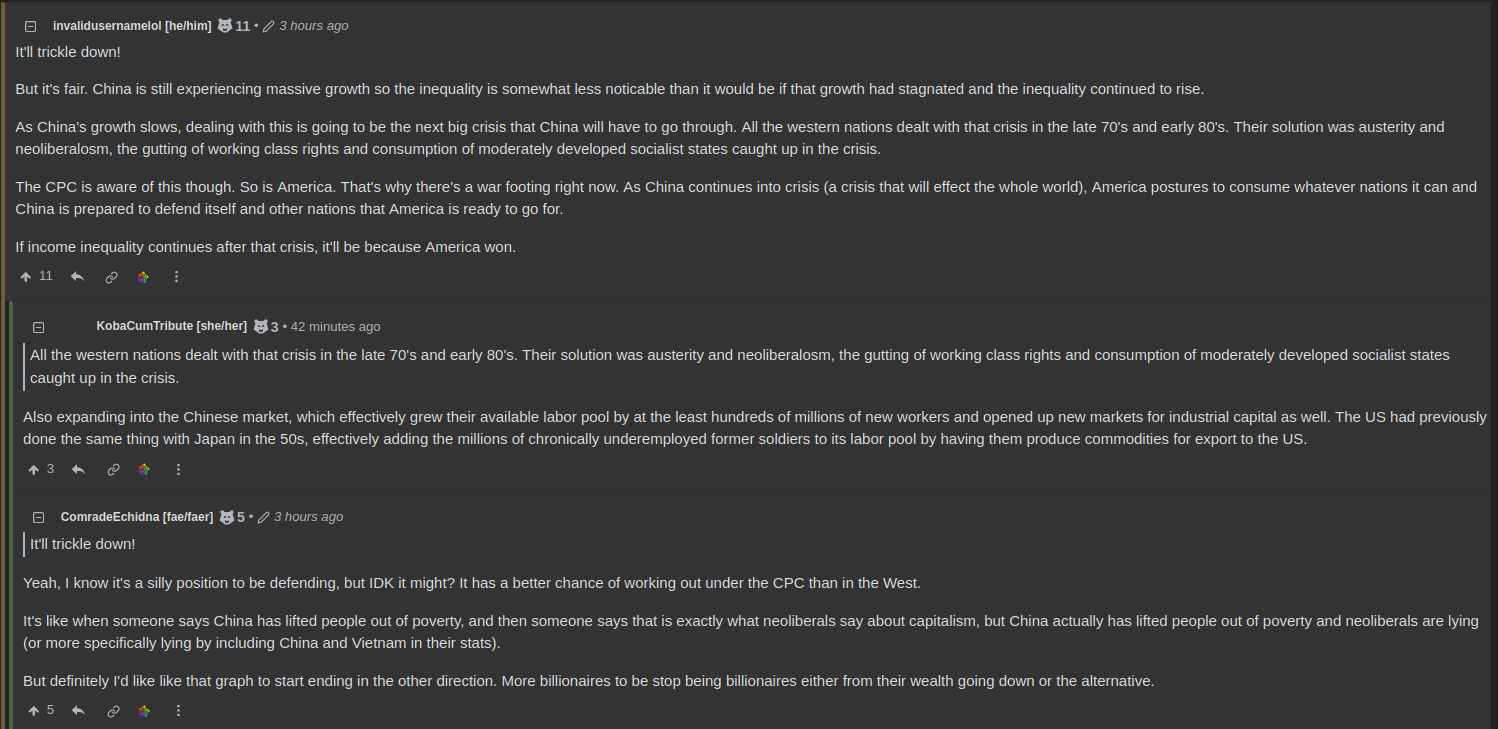
spoiler
as a certified deng beetle i am refraining from spamming deng emojis at you

Im mostly just goofing but yeah it's going to be a deeply crucial problem that needs to be solved, and the way it is solved will determine whether good or bad things are possible in the future for this world. Please don't fuck this up, China.
Yeah they need some socialist roaders back in power, probably won't happen any time soon though.
One things for sure, Xi isn't the man for the job.
We’ll see, he’s been doing a lot of rooting out corruption and ending food insecurity and extreme poverty while building up the infrastructure of the country and contending with the endless hostility from America, but he has recognized that inequality is a problem which needs to be addressed over the next several 5 year plans.
Personally, I’ll defer to the hundred million members of the CPC to determine whether he does a good enough job at it or if somebody else needs to take the reins.
Yeah it definitely would be. If you follow the link for the source you'll find some data but it's not as exhaustive. One of the refrains in Capital in the 21st Century is that wealth inequality is always more dramatic and extreme, and another is that it's incredibly irresponsible for states to not be recording and publishing data about wealth so citizens can make informed decisions. (You can already hear the libness coming out - it's a good book if you can get past that)
for a second I thought you were talking about Das Kapital and were calling marx a lib and I was genuinely impressed
Wealth inequality won't be much bigger in China specifically because communism almost completely flattened it a few decades ago so it hasn't had that much time to build up.
The US getting worse correlates with the destruction of the USSR. The ruling class saw the exact moment in time they had won and began to exploit harder knowing they no longer had to put up anymore pretence to compete with the socialist threat.
Show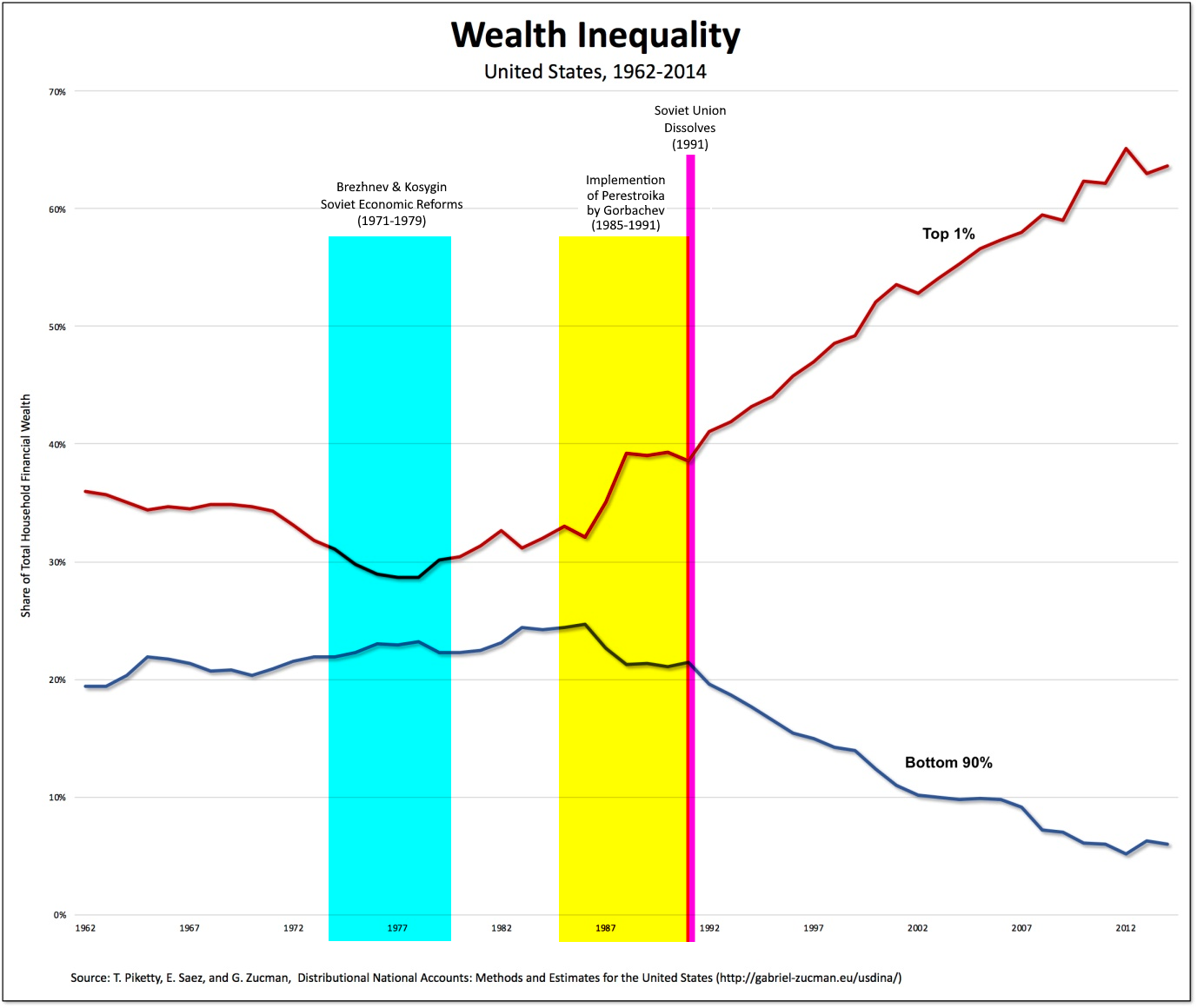
Ugh, they wasted no time too... literally a straight line up and hasn't slowed at all ☹️
Not to worry. Income inequality in the USA is at similar levels to France in the pre-revolutionary era. These two times and places are vastly different, of course, but if you were a member of the bourgeoisie, would you feel secure? I’ve been feeling lately that the relentless sinophobia in the corporate press is a kind of proof that the monster is indeed afraid. If they were unafraid, they would have no problem with occasionally allowing communists to speak in public. But even on the internet, outside of a few niches like hexbear, this is strictly forbidden. Even the American masses are not actually that stupid and are perhaps not even so evil. Given the right circumstances and education and leadership, they could become just as radicalized as people in China during the revolution.
Unlike Feudal France, The US exercises complete control over media and other propaganda spreading tools. Add an overbloated military and police force and a population brainwashed to fight amongst themselves for "Good" vs "Evil" where both sides are owned by the same people, there is zero chance to see anything similar to the French revolution in the US.
It is an imperfect comparison. But, despite the things you listed off, the basic contradiction still exists and revolutionary moments will begin to present themselves as the system becomes increasingly untenable. I think the “decoupling” from China and loss of the petro-dollar could easily undo a lot of brainwashing as peoples lived experiences continue to become discordant with media narratives. When the chips begin to fall, and where things go (in the US) will ultimately be up to revolutionary organizers in the US. The Paris Commune only lasted a few months before it was washed away in blood. Revolution would be shaped by the forces within the context it develops, so leftist in the US should be working very hard to shape them
People here miss the main reason for the Chinese graph. Due to rapid modernaziation and urbanization China is at a point where it has two countries with different levels of income within itself. One with some 200-300 million people in the big cities earning basicaly European level salaries and incomes and one of some 200-300 million rural residents that make 2-3 times less at least (and then various stages in between).So in the process of massive urbanization in a very short period of time a shitton of people have been uplifted to high income status while a shitton are in the way and a shitton are still not uplifted but most likely will. That creates a very unique impact in inequality metrics without context
Also that doesnt translate to equaly huge disparty in quality of life or purchasing power since in rural or small town China life ,even beyond rent, is indeed much cheaper compared to urban ereas in a degree not seen in the vast majority of countries . That particular configuration is very specific to China. For example the median US "rural" income is just 20% lower than the median urban one and despite that income inequality is so immense nationwide
And all that ignoring the particularities that arise if you try to make a wealth graph for China instead of income. With 90% home ownership rate, very large savings compared to other countries, an ever present in kind welfare state and a "at least on paper" people's state that can be argued to actively control most of the wealth in various ways . Even for a "de formed" workers state how can you really make a wealth graph that accounts for the non capitalist particularities of ownership and control
Also how can you even compare stats like that between different modes of production. The bottom 50% in 1930s China were landless peasant serfs slaving on feudal warlords and living till 33 years old. What does them having 25% of Chinas income share even mean or even matter? How can you compare it to the situation I described above. How is it even calculated in such a context ?
It's nothing like comparing and calculating the stats in Western capitalist countries now vs in the 30s or 40s
Good points, but rich mfers in China are still really rich. There’s a big delta between tech bros and Foxconn workers living in Shenzhen or whatever. Still, even the folks on the bottom of the ladder are afforded life’s necessities, you won’t see tent cities for example
Yeah China has more people living in rural areas than the EU or the US has people. It's a current massive undertaking to modernise or urbsnise further
The graph also doesn’t take imperialism or colonialism into account, how amerikkka’s global south vassals are vastly poorer than the vast majority of Americans living within the USA’s borders. Income also doesn’t always equal class. Labor aristocrats in the USA can make more money than the petite bourgeoisie, for instance.
I absorb all my China info 3rd hand or worse from internet communists, but word on the street is that the CPC had explicitly stated that the primary contradiction of this era is uneven development between rural and urban areas, and resolving this contradiction is now a primary focus.
Actually existing socialism is when you have worse inequality than post brexit Britain.
It’s worth noting that in China the poorest have seen incredible increases in their standard of living and extreme poverty has been essentially eliminated during the same time period. So its entirely incomparable to say, the United Kingdom or United States where life is getting worse for poor people while the rich get richer.
That said, yeah, income inequality is a contradiction that comes with using capitalism, even a controlled form of it, to develop the means of production. It’s a contradiction that the Communists running China are aware needs to be managed as evidence by plans to address it in upcoming 5 years plans, whereas the focus of previous 5-year plans has been about growing the means of production and eliminating the worst poverty and food insecurity, goals which were met or exceeded.
actually existing socialism is when you manage to achieve what China has achieved from the absolutely destitute conditions that the communists started with, and didn't have the advantage of having the largest empire in human history up to that point feeding material surplus into the core
Yeah the communists did a great job of priming China for a rise to superpower status, but I think they'd not be so stoked on this turn to state capitalism
Aren't you the one I had a conversation about "state capitalism" with before? China is not state capitalist in the proper sense, though some sectors like oil can be described that way.
I doubt it, I don't bring it up that much because I don't find it to be a very productive discussion, but its possible
There are texts out there which Mao wrote, which I wish I could find, where he sounds just like Deng. China is different from the USSR for many reasons, one of which is that the Bolsheviks rapidly gained power over a vast region while the CPC governed various regions of China for decades before winning the civil war. Both before and after that victory they constantly had to deal with the issue of how you build up the productive forces when you have almost nothing to begin with WITHOUT betraying the revolution. China’s current policy is basically the USSR’s NEP on steroids, and is anyone here going to argue that the NEP was not socialist?
I’ve also been thinking of something Deng said—how a market is socialist if socialists control it and capitalist if capitalists control it. This might seem ridiculous at first glance, but would any Marxist call an ancient Roman slave market capitalist? It really is something qualitatively different, even if it is still horrifying and exploitative.
It seems like many of the revolutions have been betrayed after the USSR failed.
If this were the case, AES states would have stopped calling themselves socialist and then they would have subordinated themselves to the imperial core a long time ago. The USA would not be thirsting for Chinese blood if China were an ally of imperialism.
Furthermore,
“The highroad of history is not a sidewalk of the Nevsky Prospect. It passes all the way through open fields, at times it cuts across marshes or forests. Those who are afraid of soiling their hands had better keep away from politics."
https://redsails.org/compromise-and-sacrifice/
I’ve also spoken with Chinese people living in China about whether China is socialist or not. Every one I’ve spoken with thinks the question is absurd. Just to take one example, they all learn Marxism in school and have easy access to Marxist texts in their libraries. If the government were revisionist, why would it expose all of its people repeatedly to radical texts? Certainly there are gusanos in China who are eagerly fleeing to America so they can get murdered by lynch mobs, but the vast majority of people there approve of the CPC.
When capitalism began, it was forced to use the feudal tools at hand (such as century-long fixed rate rents) to build itself up and destroy feudalism. Socialism is no different. China is building its productive forces while getting many capitalists to eat out of its hand. Once the BRI and the BRICS have built up an alternative world economy that no longer requires the participation of the USA (and once they can be certain that the USA will not respond to this by launching all its nukes), they will move on to the next stage of socialist development. If they press the communism button now in such a hostile environment, they will lose everything.
AES is when you ride on the coattails of the work and achievements of the communists who came before you while you lead the country towards capitalism.
I would recommend you read this short essay by Red Sails, particularly this quote by capitalist Deng Xiaoping, cynically saying why socialism must be an act in the future and thus enriching himself and his buddies:
It is only possible to achieve real liberation in the real world and by employing real means, that slavery cannot be abolished without the steam-engine and the mule and spinning-jenny, serfdom cannot be abolished without improved agriculture, and that, in general, people cannot be liberated as long as they are unable to obtain food and drink, housing and clothing in adequate quality and quantity. “Liberation” is an historical and not a mental act, and it is brought about by historical conditions, the development of industry, commerce, agriculture, the conditions of intercourse.
Will it be possible for private property to be abolished at one stroke? No, no more than existing forces of production can at one stroke be multiplied to the extent necessary for the creation of a communal society. In all probability, the proletarian revolution will transform existing society gradually and will be able to abolish private property only when the means of production are available in sufficient quantity.
Wait, shit, sorry, that was Marx and Engels. This one is actually Deng:
Deng: We summed up our experience in building socialism over the past few decades. We had not been quite clear about what socialism is and what Marxism is. Another term for Marxism is communism. It is for the realization of communism that we have struggled for so many years. We believe in communism, and our ideal is to bring it into being. In our darkest days we were sustained by the ideal of communism. It was for the realization of this ideal that countless people laid down their lives. A Communist society is one in which there is no exploitation of man by man, there is great material abundance and the principle of from each according to his ability, to each according to his needs is applied. It is impossible to apply that principle without overwhelming material wealth. In order to realize communism, we have to accomplish the tasks set in the socialist stage. They are legion, but the fundamental one is to develop the productive forces so as to demonstrate the superiority of socialism over capitalism and provide the material basis for communism.
There is no sense whatsoever, practical or principled, in refusing to credit Deng for his confidence in the Chinese people, in Marxism-Leninism and Mao Zedong Thought, and in democratic centralism as a bulwark against capitalist subterfuge. People who rightfully acknowledge Lenin’s innovations over Marx and Engels and then turn to reject Deng’s contributions are simply practising chauvinism.
...
I want readers to abandon their unearned sense of moral superiority, the one that leads Westerners to arrogantly declare Chinese choices betrayals. I want them to adopt instead a curious approach, one that tries to understand why someone like themselves would make such choices, even if it doesn’t appear obvious at first. With this mindset, it turns out anyone, not just “scholars” and “experts,” can participate in the conversation, simply by considering the difficulties and contradictions China must manage:
Many people are not selfless, and in fact downright selfish and greedy, so that dream keeps them working hard. Making room for their ambition stems the brain-drain of talent, which is a zero-sum game. Some of the fiercest and most dangerous opponents of the Soviet Union and Cuba were in fact vengeful “expats,” whereas in China’s case most vile but intelligent capitalists stay behind, within disciplinary reach of the Communist Party.
Billionaires work as “adapters” to the rest of the capitalist world, enabling trade and collaboration as well as tempering anxiety arising from fear of the unknown, which helps prevent encirclement.
They exist as scapegoats if one is ever needed. Consider how narratives about the Soviet Union always attribute every incident that ever occurred in its history to the deliberate malice of the Communist Party.
It might be possible that instead of us, living in fully capitalist societies, being the ultimate arbiter of what socialism and communism is and is not, we might instead be the students and the Chinese and Cubans and North Koreans and so on are the teachers.
I agree, we should be students, but whom should we be students of? The countries you mention are not monolithic, and they have obviously had changes in political line and objective conditions over the decades.
Mao and the CPC went through much of the struggle that Marx and Engels describe, but they did it by building socialism, not capitalism. I choose to be a student of the China's socialist roaders, not China's capitalist roaders.
This is en excellent book on the subject, with a free PDF download available https://foreignlanguages.press/new-roads/from-victory-to-defeat-pao-yu-ching/
Personally I'm not particularly critical of the China of today, since they're an important opponent to the imperialism of the Global North. But it is very clear to me that their economy is not socialist, despite them practising democratic centralism and having significantly expanded workers rights compared to neoliberal countries.
I don't think that's a very charitable characterization of their perspective comrade. It's not unreasonable to be concerned about those levels of inequality.
Ik, I'm not really trying to start a conflict or debate
Just playfully responding to one casual quip with another
If they put a more serious critique or question I would've ignored it or replied with an equally respectful response
A very large part of Chinese income inequality is the huge rural-urban divide. All countries have it but its an order of magnitude worse in China so there are basicaly 2 different countries within China . Having 300 million people in the biggest cities earning western levels of income and 300 million people in rural small towns and villages earning a 4th of that skews the metric a lot EVEN tho life in rural ereas is indeed that much cheaper.Thats hugely different than wages in London being 1.5 times more than "rural" england but prices becides rent being almost at the same level. And thats besides talking about wealth vs income inequality
I think it has something to do with some really powerful eyebrows but I'm no expert

















